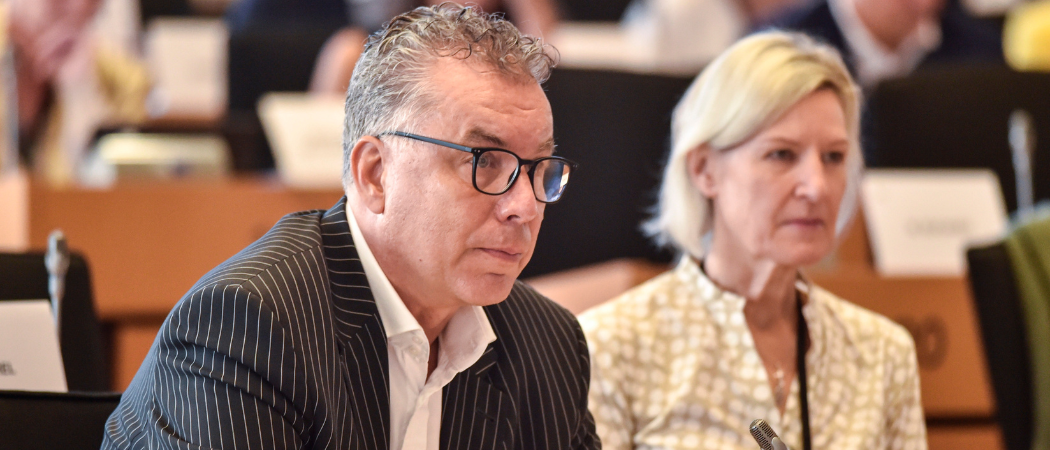MEP Christian Ehler says he’s discussed creating a legal framework with the Commission president as Parliament prepares a formal call for action. The Commission rejects the claim it is failing in its legal responsibility to protect scientific freedom

MEP Christian Ehler is leading the European Parliament’s push for legislation on scientific freedom. Photo: Eric Vidal / European Union
The European Parliament’s push for legislation on scientific freedom is picking up speed, with MEPs gathering to debate an upcoming call to action in the ITRE research, energy and technology committee.
The call, led by MEP Christian Ehler, the Parliament’s rapporteur for the €95.5 billion Horizon Europe research programme, will nudge the Commission to present a proposal for a legal framework to protect the freedom of scientific research in the EU.
Ehler alluded to having secured backing at the top of the Commission. “I had recently a conversation for quite a while with the president of the Commission Ursula von der Leyen on that issue as part of our ambitions to strengthen the rule of law, and I hope of course that the Commission will follow our leadership by tabling a legislative proposal as soon as possible,” Ehler told MEPs.
The Parliament’s move comes as reports of steady erosion to scientific freedom around the EU mount, endangering the bloc’s reputation as a safe haven for academics.
The EU hasn’t been standing still on the issue. In the last few years, the European Commission moved to include scientific freedom as a key topic in its European Research Area (ERA) policy agenda, while the German government led a push for the Bonn declaration on academic freedom during its six-month stint at the driving seat of the Council of member states.
But MEPs want more than non-binding promises, as the debate becomes increasingly complex. For some, the question goes beyond outright abuses of scientific freedom and cuts through the very nature of public funding for research.
For one, the move away from open, bottom-up calls for research towards more strategic research programming is seen by academics in some countries, including Denmark, Estonia, Finland, Slovakia, Slovenia and Sweden, as a threat to academic freedom, said MEP Lina Gálvez Muñoz, who was speaking on behalf of fellow S&D MEP Alex Agius Saliba.
Efforts are therefore needed “to create minimum framework conditions to be required with respect to academics’ self-governance, the academic labour conditions and the financial conditions for academics in order to allow academic freedom to be exercised in the best possible ways,” she said.
Has the EU been doing enough?
The high-level talks on scientific freedom started a few years ago, prompted by Hungary’s decision to ban foreign universities with no campus in their home countries from awarding degrees in the country. This forced the Central European University (CEU), which gave double US and Hungarian accreditation, to move from Budapest to Vienna.
Amid widespread criticism, the European Court of Justice (ECJ) ruled that Hungary’s move was illegal. But Ehler noted, despite the court coming to a decision, it was not on the basis of a solid legal framework protecting scientific freedom.
Instead, the decision came down to trade rules. “The legal base to condemn that member state was not on academic freedom,” said Ehler. “It was basically that the freedom of a private entity to work in the member states was threatened by the decision.”
Reflecting on the events, the Parliament’s report claims the failure to ensure a legal framework is “a serious abdication” of the Commission’s responsibilities, given the protection of scientific freedom is enshrined in the EU treaties.
This is where the Commission and Parliament’s views diverge. Anna Panagopoulou, director at the European Commission's directorate for research, who presented the Commission’s work in the area to the committee welcomed ITRE’s report but insisted the Commission has been doing its best to address the issue.
“We are really happy with the resolution in general,” she told MEPs. Nevertheless, “we disagree with the statement of the draft report that the Commission's failure to use its legal authority to protect the freedom of scientific research is a serious abdication of its responsibility.”
Ehler says that while the Commission’s work is welcome, non-binding exercises for which member states need to sign up for won’t fix the issue. “I think the union must do what in can do to protect the freedom of our scientists to conduct their research and communicate their results without fear and reprisal,” he said.
The MEPs primarily call for a legal definition and a framework to protect scientific freedom, but the Parliament research services have also identified a number of other measures that could make a difference, including creating an EU-wide platform for reporting breaches to freedom, keeping a dedicated scoreboard, and linking scientific freedom to the EU’s rule of law reporting mechanism.





 A unique international forum for public research organisations and companies to connect their external engagement with strategic interests around their R&D system.
A unique international forum for public research organisations and companies to connect their external engagement with strategic interests around their R&D system.